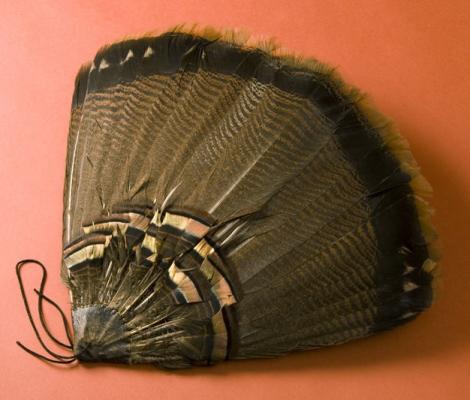A student of Mary Baker Eddy once commented, “Mrs. Eddy seemed to care little for the large or expensive presents given her by her followers, but she called … attention with delight to a fan made of turkey feathers ….”1 This turkey feather fan was a gift from two of her followers, Elizabeth Earl Jones and Lily Hazzard, and it sheds light on the early history of African-Americans in Christian Science.
In the letter from June 19, 1900, which accompanied this fan, Elizabeth Earl Jones wrote to Mary Baker Eddy, “All who have lived in Charleston are familiar with the turkey tail fans, and as a Southern souvenir this fan is sent to you.”2 She went on to say that fan was made by a local African-American man who had been making these fans for sixty-five years and that this particular wild turkey was from one of the plantations near Georgetown, S.C.
Jones’ letter continued as a report to Eddy on the interest of African-Americans, who lived on these plantations, in Christian Science. Today, Jones’ attitude seems patronizing, but at the time it was not uncommon for those sympathetic to the plight of African-Americans to see themselves as superior to those they were trying to help. Jones’ way of thinking does not negate the impact of Christian Science on this community. As she wrote to Eddy, “On these plantations we work among the negroes during the winter, and are endeavoring to destroy the race laws holding them in deeper bondage than slavery [of] years gone by. … When the Bible and ‘Science & Health with Key to the Scriptures’ is read to these simple folk, they stand with bared heads and hungry faces, drinking in the Truth.” She continued, “Time and paper cannot suffice to tell of their many, and some wonderful, demonstrations of God’s unfailing love. Among claims overcome are tooth-aches healed and cavities filled. Tobacco habit destroyed, accidents, fears, and sicknesses overcome.”3
Eddy was clearly moved by Jones’ report and responded to her letter through another Southern Christian Scientist, Sue Harper Mims: “Please thank your student for me for her precious letter to me and the home made fan. Tell her to say to the colored folks that love to read S. & H. [Science and Health] I will send them my loving thoughts as I do today and they will be blessed. God help them.” 4 Today the turkey feather fan serves as an emblem both of the early Christian Science movement and of race relations in the United States at the turn of the twentieth century.


